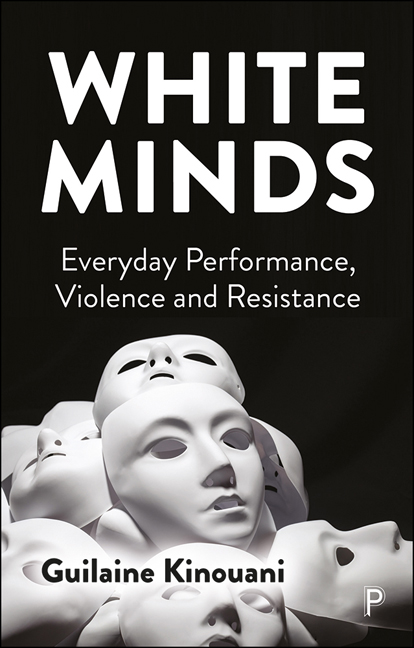Book contents
- Frontmatter
- Dedication
- Contents
- Acknowledgements
- Preface
- Note on language
- Introduction
- 1 Whiteness, time and space
- 2 White gazes
- 3 White envy
- 4 White sadism
- 5 White trauma
- 6 White dissociation
- 7 White shame
- 8 White ambivalence
- 9 White complicity
- Whiteness and resistance: by way of conclusion
- References
- Index
- Frontmatter
- Dedication
- Contents
- Acknowledgements
- Preface
- Note on language
- Introduction
- 1 Whiteness, time and space
- 2 White gazes
- 3 White envy
- 4 White sadism
- 5 White trauma
- 6 White dissociation
- 7 White shame
- 8 White ambivalence
- 9 White complicity
- Whiteness and resistance: by way of conclusion
- References
- Index
Summary
‘In this country in 15 or 20 years’ time the black man will have the whip hand over the white man.’ … I am filled with foreboding; like the Roman, I seem to see ‘the River Tiber foaming with much blood’.
(Powell, 1968 [1])A cultural note
It was on 20 April 1968 that Enoch Powell, the prominent member of the Conservative Party, made his now widely known and infamous speech, ‘The Rivers of Blood’ [2]. A speech which was so drenched in paranoia, racialised imaginary and hate that it would inscribe itself into British memory and remain the object of sustained political analysis. It provoked repulsion and fascination in equal measure for decades to come. Powell’s speech shook the nation largely because it employed discourses and devices which, until then, had been seen as the province of far-right politicians, white nationalists and extremists. The speech contained powerful imagery describing an apocalyptic Britain on the brink of black annihilation. Metaphors included, of course, the spreading of white natives’ blood, Britain ‘heaping up its own funeral pyre’ under the watchful eyes of ‘wide-grinning piccaninnies’.
The contents of the speech, which in many ways normalised within the UK mainstream the politics of racial paranoia, continue to make many of us recoil. I have attempted to fully re-read the entire text and considered incorporating larger extracts for a closer analysis in the present chapter. However, so strong and visceral was my response to the words I was reading, in the end, I simply was not able to. My will to read was overcome by a sense of repulsion which, no doubt, activated my own trauma-loaded response.
Another cultural note
On 17 June 2015, the same paranoia-filled ‘logics’ led to the mass shootings and murder of nine African American church-goers in Charleston by 22-year-old Dylann Roof. During his trial, it was found that Roof had wanted to start a ‘race war’ [3]. That he had dedicated hours to bemoaning and writing about how evil black people were. This belief in the threat posed by blackness was unshakeably held in the absence of evidence of him having been hurt by a single black person. In his own statement to the FBI, Roof confirmed he had never suffered harm at the hands of a person racialised as black.
- Type
- Chapter
- Information
- White MindsEveryday Performance, Violence and Resistance, pp. 85 - 100Publisher: Bristol University PressPrint publication year: 2023



